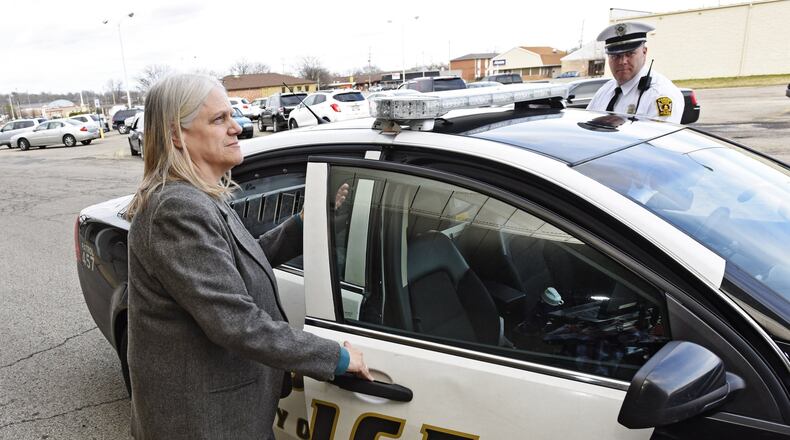“It is really impressive, they really have made a lot of headway, especially in collaborating,” Stratton told the Journal-News about a meeting she had with the Stepping Up committee here last week.
Commissioner Cindy Carpenter has led the charge in the county.
RELATED: More Butler County first responders are undergoing this new training for their ‘difficult runs’
“The Initiative is a vital effort to help people with severe mental illness and substance abuse disorders stay safely out of jail by building collaboration between law enforcement, mental health providers and support groups like the National Association on Mental Health,” Carpenter said. “We have worked to combat stereotypes, decrease conflict and stigma and provide a wider range of services.”
The committee meets regularly to seek solutions to a wide range of problems including the lack of a countywide crisis stabilization center, help for the homeless and services to help recovering addicts stay sober. Several new initiatives have or are about to be launched.
There is recovery housing here, but not nearly enough, officials said. Scott Rasmus, executive director of the mental health and substance abuse board, said his board this week is expected to release a request for proposals for an estimated $300,000 to add 50 recovery beds in the county.
Hamilton Municipal Court Judge Dan Gattermeyer launched a new “empowerment” docket before the holidays, geared to helping homeless people who have been charged for criminal trespassing.
“Agencies are there, we look at the individuals who are cited there and we look at housing and treatment and the judge asks them what they need,” Kathy Becker, a well-known homeless advocate in the county told the Journal-News. “He’ll (tell) people what might be missing that would be helpful to (them).”
A countywide crisis stabilization dropoff center because of funding and location issues. Police officers around the county have undergone crisis intervention training outside the county for years, but last year the first in-county training was held. There were two held last year, and two are scheduled for this year, with 38 officers trained so far.
“A lot of these officers now are trained to deal with it but we don’t always have the resources to do something with these people,” Rhonda Benson, executive director of the local chapter of the National Alliance on Mental Illness, said.
“Because if they’ve not committed a crime and they are not a danger to themselves or others, you can’t force them into a hospital so it’s very tricky. That’s what we are trying to look at in the county, what can we do with those folks.”
Butler County Sheriff’s Chief Deputy Anthony Dwyer said many people who end up in his jail get there because they have committed a crime due to their mental illness.
“If I could wave my magic wand and place them someplace for their treatment, it’s their mental health, it’s not a conscious act,” Dwyer said.
The jail works to aid inmates with their issues while they are incarcerated and then continue help when they are released, Dwyer said.
If there were a crisis stabilization dropoff center, police could take people there for immediate aid. They could later taken somewhere other than the jail for help.
The legislature approved $35.75 million in additional funding for crisis stabilization in the biennium budget, according to Rachel Massoud, a policy analyst for the County Commissioners Association of Ohio, and $9.25 million is for infrastructure.
Stratton said the state this year is developing a “road map” for the best way to utilize those funds, and Butler County is in a good position to get funding.
“They’re positioned to really take advantage of what we end up coming out with in terms of suggestions and models and funding, because they’ve already got that groundwork laid,” Stratton said. “I think they are a real leader in the state.”
About the Author
